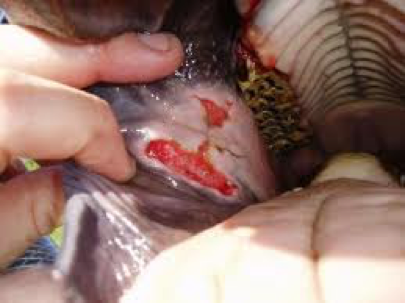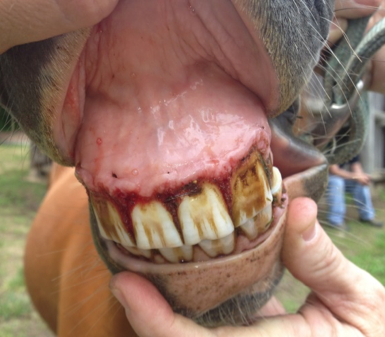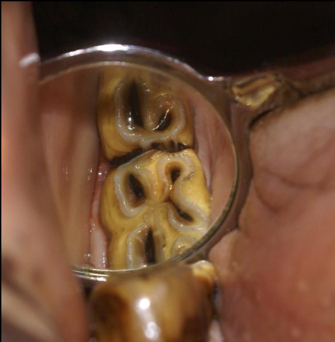There is no better time than spring to get a jump start on your horse’s oral health. While most horse owners are familiar with the sings of severe dental disease like feed dropping, foul breath, unexplained weight loss, and colic, many are unaware that mild oral problems can cause more subtle changes in horse behaviour. Head tossing, rearing or bucking, poor collection, resistance to turning in one direction, or poor responsiveness to the reins can all be signs that there may be a problem in a horse’s mouth. A thorough dental examination by a veterinarian will help to identify and treat these early oral lesions, thus setting riders up for success in the upcoming show season.
Sharp Points
One of the issues most frequently seen during routine dentals is sharp points on teeth. A horse’s teeth grow continually and are worn down during chewing; however, since the upper jaw is wider than the lower jaw, points often develop on the outside of upper teeth and the inside of lower teeth. Even though tooth edges may not look or feel very sharp to a person, points can cause injury to a horse’s cheek and tongue. Similar to the sensation of biting one’s own tongue, repeated trauma to the delicate tissues of the mouth can be tremendously painful. Sharp points are removed by filing during a dental float. Care must be taken, however, to avoid removing excessive tooth and thus setting a horse up for infection and other problems.

Oral ulcers caused by sharp points.
Source: https://www.littletonequine.com/faq/can-cause-ulcers-mouth/
Periodontal Disease
Periodontal disease is another very common condition, affecting up to 40% of young (3-5yo) horses and 60% of horses over the age of 15y. It is also the leading cause of tooth loss in the horse. The first stage of periodontal disease is gingivitis, which is inflammation of the gum surrounding the tooth. Gingivitis is reversible and fairly easily treated after diagnosis. Horses with sharp points, hooks, and other physical deformities of the tooth are predisposed to developing gingivitis, which can then lead to periodontitis. The second stage of periodontal disease, periodontitis is usually progressive and non-reversible, ultimately leading to the loosening and loss of teeth. Prevention of periodontal disease is key; thorough yearly dental examination by a veterinarian is the best way to identify and eliminate small oral issues that could lead to big problems later.

Severe gingivitis due to periodontal disease.
Source: http://foundationequineclinic.com/geriatriccare/
A Veterinary Dental Exam
An annual comprehensive dental exam and float by a trained veterinarian is a crucial part of a horse’s overall health and wellbeing. The exam includes a thorough discussion of the horse’s history and any potential issues, helping to target possible problem areas.
The veterinarian will evaluate the external structures of the head and the movement of the jaw during chewing to assure that no structural problems are present. A speculum will be used to open the mouth and a visual exam will be performed using a bright light and dental mirror.
The veterinarian will complete a dental chart of all teeth in the mouth, taking measurements and noting any abnormalities to enable monitoring over time.
They will remove sharp points and work to correct larger hooks and ramps so that teeth remain healthy and functional. Finally, they will develop a practical treatment plan for any issues present.


